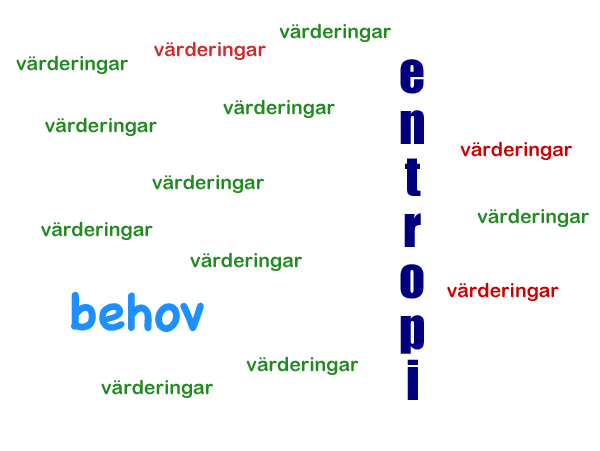Vi tar vår hemsida till nästa nivå

Under hösten har vi arbetat med att utveckla vår verksamhet och vårt erbjudande. På vår nya hemsida har vi sökt tydliggöra vårt grundläggande synsätt på ledarskap och organisationsutveckling. Vi har också beskrivit vårt arbetsområde, viktiga byggstenar i arbetet och våra nya produkter.
Du finner också nyhetsbrev på hemsidan och vi fortsätter att publicera dessa till dem som önskar följa våra reflektioner och rapporter från ledarskapslitteratur, forskning och studier.
Besök gärna vår nya hemsida som du finner på www.ccorgs.se
Vår strävan är att stödja ledare som vill utveckla nya perspektiv och förmågor.
Genom aktuell forskning upplever vi tydligare än någonsin betydelsen av djupare medvetenhet kombinerad med det helhetstänkande och den förståelse för mänskliga processer som visar sig allt mer nödvändig. I varje fall för de ledare som vill åstadkomma en mer långsiktig och varaktig förändring och en hälsosam organisationskultur. Vi vet att många strävar efter att vara goda ledare. Personlig utveckling är en utmaning och en möjlighet.
”Organizational change is inseparable from individual change. Simply put, change efforts often falter because individuals overlook the need to make fundamental changes in themselves”. (McKinsey, 2014)
Varma hälsningar
Ulf och Annika
Publicerad av myNewsDesk 2016-09-16 Kulturell entropi och värderingarKulturell entropi och värderingar

Richard Barrett (*), som länge arbetat internationellt med organisationers utveckling har myntat begreppet ”kulturell entropi”. Det står för den mängd energi som en organisation förbrukar på improduktivt arbete och är ett mått på den grad av rädsla, konflikt, friktion och frustration som finns i organisationen.
Graden av kulturell entropi i en organisation hänger samman med hur människor upplever företagets kultur. Den är kopplad till gapet mellan uttalade företagsvärderingar och ledningens agerande. Kulturell entropi kan mätas och ge en indikation på hur organisationen mår och vad som behöver göras för att förbättra läget och öka förtroendet.
Gapet mellan ambition och verklighet
Många organisationer strävar efter att utveckla kulturen och i högre grad styra med värderingar. Man brukar söka förbättra exempelvis motivation och produktivitet genom att skapa en bra arbetsmiljö där människor har större möjlighet att själv styra sitt arbete och kan ta ett ökat ansvar för helheten.
Att få värderingar att genomsyra kulturen är ett omfattande åtagande som kräver ett stort och långsiktigt engagemang. Men tyvärr stannar detta arbete ofta på en alltför ytlig nivå.
Det är vi människor som skapar kulturen och ska den förändras måste vi förändras. Det ställer krav på insatser från alla i verksamheten men det går heller inte att komma ifrån att ledningens förmåga att agera i enlighet med den kultur man vill utveckla är en avgörande faktor.
När individens viktigaste personliga värderingar ligger i linje med organisationens uppstår förutsättningar för handlingskraft och trivsel. Men om man upplever att inflytelserika och på andra sätt betydelsefulla personer bryter mot värderingarna eller dess intentioner föds besvikelse och ofta även förakt.
Ju större man upplever gapet mellan de uttalade värderingarna och viktiga personers handlingar desto mer ökar vantrivsel, rädsla och friktion vilket driver upp graden av kulturell entropi.
Värderingar är ofta mångdimensionella
Värderingar är i sig inget enkelt och entydigt begrepp. De representerar mångdimensionella och betydelsefulla drivkrafter som har varierande innebörd för olika personer. Det är inte ovanligt att människor upplever dem som något ganska abstrakt och svårgripbart.
Även om de konkretiseras i ord, kommenteras i längre fraser, diskuteras och skrivs i verksamhetspolicyn så kommer tolkningen alltid att innehålla en personlig komponent. Människors olika erfarenheter genom livet leder till att orden i viss mån får olika känslomässig laddning och betydelse.
Men vad är egentligen en personlig värdering? Man kan säga att de är ett slags antaganden eller trossatser om vad som är viktigt (ex. humor och glädje), hur jag själv vill vara (ex. positiv) och hur jag vill uppfattas av andra (ex. smart).
Personliga värderingar formas genom tidiga lärdomar och djupt liggande föreställningar om hur vi bör tänka, känna och uppträda.
En del människor ser värderingarna som sanningar eller självklarheter. Några kanske bara inte reflekterat över att andra synsätt kan vara lika riktiga och berättigade medan andra kan vara mer låsta och anse att deras egna värderingar inte behöver diskuteras. Vi kan alla hitta egna exempel på antaganden och uppfattningar som vi är ganska fixerade vid och som vi inte tycker behöver ifrågasättas. Ett exempel från vardagen skulle kunna låta så här: ”Det är självklart att det är viktigt i dagens arbetsliv att vara en driven person. Hur skall vi annars nå resultat!”
Värderingar illustrerar behov
Det man kanske inte så ofta tänker på är att värderingarna är intimt förknippade med våra underliggande mänskliga behov såsom exempelvis trygghet, gemenskap, få känna sig värdefull och kompetent, ha mening i sitt liv etc. De är behov vi faktiskt inte kan välja bort utan behöver uppfylla för att må bra och leva ett hälsosamt liv. Värderingarna fungerar som en typ av inre guide. De ger motivation och driv för att ta hand om de viktiga behoven och därmed styr de på många sätt våra beteenden.
Personliga värderingssystem kan förändras och utvecklas. Men för att förstå inre drivkrafter och beteenden behöver man göra en form av inre djupdykning. Det är en förutsättning för att bättre förstå komplexitet och dynamik både hos sig själv och hos andra.
För att kunna utveckla en väl fungerande värdestyrd organisation måste dessutom tillräckligt många – chefer och medarbetare – ha utvecklat en större personlig medvetenhet och mognad.
Ofta ger både ledning och medarbetare allt för lite utrymme och möjlighet till denna personliga fördjupning och perspektivutveckling. Vi behöver tid och tålamod för den här typen av förändring. Kanske behöver var och en ibland påminna sig om det. Särskilt i dagens samhällsklimat när allt skall gå så fort.
För att integrera nya perspektiv så att de blir lättillgängliga och flexibelt tillämpbara behöver man medvetet och kontinuerligt arbeta med de nya perspektiven. Det räcker inte med att upptäcka. På så sätt liknar den här utvecklingen all annan inlärning. Vi blir inte skickliga utan ”träning”.
För den som vill läsa mer föreslår vi:
*) Cultural Transformation, Richard Barrett, Barrett Values Centre
”It Starts with One”, J Stewart Black och Hal B Gregersen, INSEAD
”Beyond Change Management”, Dean Anderson, Linda Ackerman Anderson
Publicerad av myNewsDesk 2016-04-17 Att utveckla organisationer, del 2 – Under ytanAtt utveckla organisationer, del 2 – Under ytan

Känslor har stor betydelse för hur vi skapar mening i vår tillvaro …
Det som ofta är svårast när man arbetar med organisationsutveckling är att hantera de processer som inte riktigt går att ta på men som i hög grad påverkar organisationens förmåga att åstadkomma resultat. Det kan handla om intressekonflikter, olika värderingar, personliga konflikter och attityder. Det är den typ av händelser och processer som på olika sätt kan upplevas hotande mot viktiga sociala funktioner och relationer i organisationen.
Sociala hot
I förra nyhetsbrevet gav vi några exempel som visar hur pass känslig människan faktiskt är för situationer som innebär att vi upplever oss exkluderade och förlorar vår känsla av värde. Sådana situationer väcker rädsla och rädslans funktion är att göra oss uppmärksamma på potentiella faror så att vi kan skydda oss mot något som vi upplever kan vara riskfyllt på något sätt.
Neurovetenskapen har lyckats påvisa att sociala hot påverkar oss starkt och på ungefär samma sätt som fysiska hot. Förmågan att reagera på det här sättet utgår från vårt nervsystem. Den är automatisk, snabb, ”logisk” och livsviktig. Men ofta är vi inte fullt medvetna om dessa reaktioner och hur de också kan leda till oönskade konsekvenser.
Varför har vi känslor?
Rädsla är bara en av våra grundläggande känslor och känslotillstånd. Andra exempel är ilska, sorg, glädje, förvåning, intresse, avsky och skam. Känslotillstånd (t ex stolthet, besvikelse, frustration) kan vara olika sätt att tolka och beskriva inre signaler.
Hur vi förhåller oss till känslor har stor betydelse för hur vi interagerar med andra människor. Redan under den allra första tiden i livet lär vi oss villkoren för att få kärlek, acceptans och tillhörighet. Hur omgivningen tar emot och reagerar på känslor är en viktig del av detta lärande.
Trots att dessa lärdomar i så hög grad formas under våra tidiga levnadsår så kommer de på många sätt att påverka hur vi, även som vuxna, både uppfattar och agerar i sociala sammanhang. Några har lärt att vara kontrollerade och mer tillbakadragna och andra att de ska vara spontana och utåtriktade. Vilket mönster vi än har så är det ju ”på gott och ont” i den bemärkelsen att det hjälper oss att vara flexibla och komfortabla i vissa situationer medan vi i andra lägen faktiskt blir hindrade av våra inlärda reaktioner, tolkningar och beteenden.
Känslor innehåller information och de ger energi och motivation. Vår förståelse för dem har stor betydelse inte bara för hur vi hanterar sociala sammanhang utan också för vår hälsa och vårt välmående.
Förbjudna känslor?
Vi påverkas hela tiden av känslor. I varje möte och i varje process. Vi behöver kontakt med dem för att på ett nyanserat sätt kunna bedöma hur vi påverkas av en situation och vad vi har behov av. Utan deras hjälp skulle vi inte kunna göra val och fatta beslut. Vi skulle inte kunna känna in stämningar och anpassa oss till olika lägen.
Men känslor behöver processas på något sätt. Inte bara där hemma utan också i arbetslivet. Det innebär inte att vi skall ”leva ut dem” i alla lägen utan snarare kunna märka och lyssna på dem. Ibland räcker en inre bearbetning men ofta behöver de erkännas och hanteras i möte med en annan person.
Många människor tror att en del av deras känslor är fel, till och med förbjudna, och att de inte har någon roll att spela i arbetslivet; att de inte skall visas eller uttryckas. Men att trycka ner känslor under ”ytan” innebär inte att de försvinner. Just i en specifik situation kan det vara ett relevant val men som mer långsiktigt mönster får det ofta effekter som till exempel minskad motivation och energinivå, motstånd, emotionella utbrott, bristande kreativitet och ökande stressnivå.
Alternativa förhållningssätt…
Att inte vara så medveten om hur man, på ett lite djupare plan, fungerar känslomässigt innebär också att man ofta blir närsynt i förhållande till konsekvenserna av sina egna reaktioner och beteenden. Det blir helt enkelt svårare att se och ta in hur man påverkar sin omgivning.
Numera är det väl känt att vi människor kan fortsätta utvecklas genom i stort sett hela livet. Det gäller även förmågan att hantera känslor.Att lära sig förstå mer av de här sidorna i det egna sättet att vara är betydelsefullt för att vidareutveckla klokskap och autenticitet.
Att tala med andra om hur man tänker och känner är ofta en lättnad. Att dela viktiga upplevelser brukar bygga ökad ömsesidig förståelse och respekt och därmed bli en plattform också för nya sätt att samverka i en organisation.
De attityder som ledare och andra auktoriteter visar i förhållande till sina egna och andras känslor utgör en starkt normativ faktor när det gäller verksamhetens samarbetsklimat. Attityden blir en såväl verbal som icke-verbal (beteenden, kroppsspråk etc) guide för vilken typ av beteenden som är möjliga och accepterade med dig som ledare.
Så kallad emotionell kompetens handlar om att kunna känna, förstå och reglera sina känslor på ett så hälsosamt och funktionellt som möjligt. När så många av oss nu lever i tider präglade av både osäkerhet och komplexitet är det lätt att inse hur viktigt det är med denna förmåga.
Publicerad av myNewsDesk 2016-04-17 Developing Organizations, Part 2 – Below the surfaceDeveloping Organizations, Part 2 – Below the surface

Feelings help us make sense of the world …
Very often the toughest tasks when developing an organization lies in handling intangibles like conflicting interests, different values, personal conflicts, and attitudes. These are situations characterized of substantial social challenge. They evoke emotional reactions and behaviors that are often intimidating to people and therefore difficult to handle in a good way.
Socially threatening situations
Human beings are extremely sensitive to situations where we experience a potential threat to our sense of inclusion and worthiness. Such events and processes evoke fear within us and the basic function of fear is to warn and protect us from something we experience as dangerous in some way.
From neuroscience we have now learned that social threat is just as real and powerful to our organism as physical threat. So the reaction is very “logical” in its own way. It is quick and automatic and a vital part of our neurology. Most of the time we are not fully aware of these reactions and how they also might lead to unwanted consequences.
Why do we have feelings?
However, fear is only one of our basic feelings. There are also others like e.g. anger, sadness, joy, surprise, interest, disgust and shame as well as a lot of nuances (e.g. pride, disappointment, frustration).
Feelings are very much involved in how we interact with other people. From the early moments of our lives we learn about the conditions for love, acceptance and inclusion and as a part of that we learn how to manage our feelings. What we learn this way is of course closely connected to the context we grew up in – our closest caregivers and the surrounding cultural system.
This very early learning will affect and guide us even as adults. It will play an important part in how we come to interpret and behave in social situations. Our experiences will teach us how other´s react and respond to our feelings. Some of us have learnt to become more controlled and withdrawn, while others are more spontaneous and extrovert. Whichever pattern we learn is for “better or worse”. The way we manage feelings and emotions will be functional in some situations and more inhibitive in others.
Feelings and emotions constitute information, energy and motivation.
In general, people´s knowledge and attitude towards feelings vary greatly. Our understanding and skills in this area play an undisputable role the way we handle social interaction, personal health and wellbeing.
Forbidden feelings?
We are constantly affected by our feelings. In every meeting and every process. Without the aid of feelings and emotions we would not really be able to make choices and decisions. We would not be able to tune into the moods of other people and adjust to situations. We would not be able to tune into ourselves and understand what we need.
But feelings need to be processed in some way. Not just “at home” but also within an organization. Sometimes an inner personal process will be enough but often they need to be recognized and handled in a meeting with another person.
People often believe that some of their feelings are wrong, even forbidden and should not be expressed or shown in the workplace. But feelings will not disappear from the system because we try to forget about or neglect them. When we push them under the surface and pretend they do not exist we might cope in the moment but there will often be long-term implications like e.g. loss of energy and motivation, resistance, emotional outbursts, lack of creativity, and stress.
Alternative ways…
People who are not so aware about their own way of functioning within this area risk being myopic in relation to consequences of their own reactions and actions. Without a more solid awareness it is much harder to take in and process one´s own way of influencing others.
Nowadays, science has shown that human beings have the capacity to keep learning well into high age. This is also valid for how we deal with our feelings. Learning more, also about these parts of one´s own being, is therefore important to be able to grow and become a wiser and more authentic person.
To be able to talk about this and gain some understanding is often a relief. Sharing with others can build common understanding and respect as well as a platform for new ways of working together.
The attitude that leaders and other authorities show towards the feelings of others as well as in relation to their own feelings is a very strong normative factor. It is a verbal and nonverbal guide (behavior, body-language etc.) for people´s interpretation of what type of behaviors that will be possible and accepted with you as a leader.
So-called emotional competence is about skills in sensing, understanding and regulating one´s feelings and emotions in a helpful way. In times of uncertainty and complexity it is easy to realize the importance of this capacity.
Publicerad av myNewsDesk 2016-01-31 Developing Organizations, part 1 – The Power of ConsciousnessDeveloping Organizations, part 1 – The Power of Consciousness

Quality in decision-making
Human behavior, quality in decision-making and leadership are closely connected to the way we look at the world. A person´s subjective experience of reality will guide what he or she considers to be the best way of running the business and develop the organization. Often, it is not until we really stop to reflect that we realize that there are multiple ways of looking at what might be ”the right way”.
Societies, organizations and individuals operate from a mindset guided and to some extent controlled by a system of rules, norms, values and assumptions. For many people their daily experience of the context they live in can appear as the natural order of things. Others complain fiercely about the system without seeing their own part of the problem. And some blame themselves for just about anything that is problematic.
Humanity evolves in stages and so does individuals
Human consciousness determines the arena for our ability to cooperate and handle difficult problems. But the power of consciousness as a driver for human development still seems to be an underrated factor both in societies and in organizational life.
Looking back 50.000-100.000 years it becomes obvious that humanity has undergone several shifts in its way of thinking and understanding the world. In the beginning change was slow but gradually we can see that new paradigms evolve at a higher speed. Each of these paradigm shifts has brought on a new belief-system. It seems that through every major shift human consciousness has evolved and made it possible to organize and handle complexity in more efficient ways and from a new set of values.
The logic of human leadership has shifted e.g. from uncompromised exertion of power, to logic found in rules and hierarchies, to the belief in scientific logic and competitive performance.
What our next belief-system will bring and how it may assist the evolution of society and organizations we cannot know exactly. Experts speculate in this and some say that in parts of the world we are now in the middle of a big shift. It will probably bring another view of performance, control, hierarchies and capacity to cooperate. It also seems that this paradigm will bring more consciousness about and consideration for human needs and resources. Signs of this can be seen in many organizations working for more motivation through empowerment, agility etc.
But there will be no real paradigm shift until a “critical mass” of people have genuinely changed their belief-systems, expanded their consciousness and integrated some of the capacities necessary to act from their new and more advanced mindset.
Einstein said “We cannot solve our problems with the same thinking we used when we created them”. But when a paradigm shift occurs it will help us to handle problems we cannot solve today.
Organizational consciousness…
The workings of human consciousness and the human mind can still not be fully explained by science. But it is safe to say that we are dealing with a very complex system. The evolvement of new consciousness is an inner process affecting our complicated belief-systems and our way of regulating our behavior in various types of situations. We can support people in their personal growth process but we cannot force the evolvement of new awareness and values.
In organizational settings, it is common practice that management tries to change ways of working and acting by creating new policies and value systems. But even if the reason for a change seems relevant and can be understood by practically everyone the hard work to apply the new system will often bring more action than change. The old established paradigm still prevails – for leaders as well as employees.
Many organizations today strive to become values driven. But if the prevailing organizational belief system rests firmly on a hierarchical and more controlling paradigm most decisions will be made according to that. This doesn´t necessarily mean that the decision is bad or wrong but a problem arises when it is done without awareness and with little consciousness about the consequences. This is a phenomenon that will not only prevent development but also cause contempt for management and espoused values systems.
Most people are not very aware of how they make decisions, at least not in the moment. We are simply not conscious about the fact that our decisions may support the old belief-system and safe practices. And if we are aware we still might not dare to believe enough in the new system. Even if the new ideas also seem logical in some way and we were part of creating them. So we choose what seems to be the best and most reasonable decision. We just want to do a good job!
Taking your organization to a new level of consciousness
Taking your organization to another level can be about many things but supporting the evolution of consciousness so that you can act from another paradigm may be one of the most important ones.
The need to change people´s mindset is not a new concept when developing organizations but doing so by supporting the evolution of new consciousness is not the most common approach.
To assess what mindset your organization actually operates from could be an interesting process and a part of expanding your awareness and your basis for decision-making.
In our coming newsletters we will reflect on ways of supporting organizational development :
-How to support the development of higher stages of consciousness
-The necessity of both realization and integration
-What does it mean to develop organizations with an integral mindset
If you wish to dive into the subject you can find more information by reading some of the work from e.g. Ken Wilber, Frederic Laloux, Robert Kegan, Bill Torbert, or Susanne Cook-Greuter.
